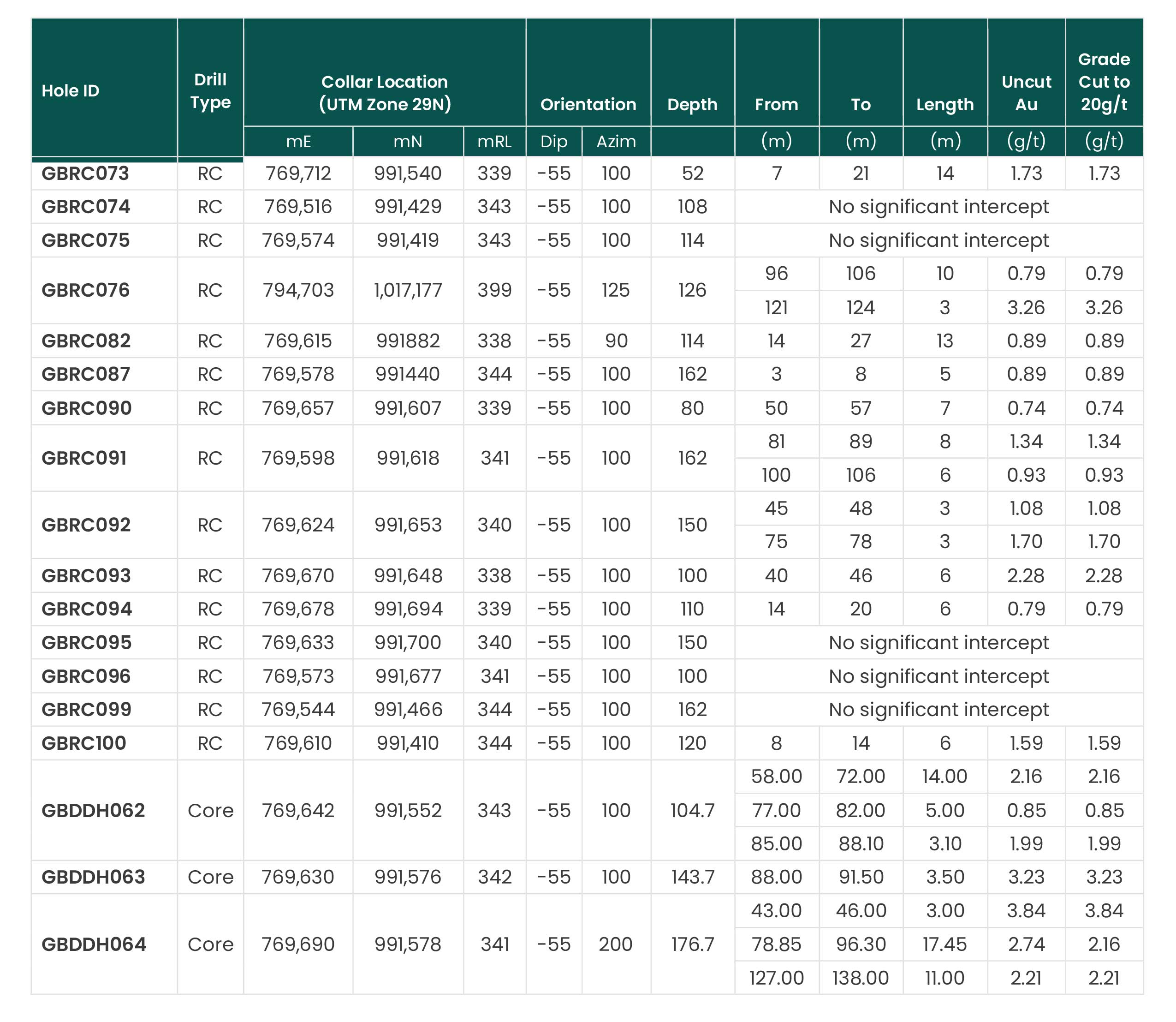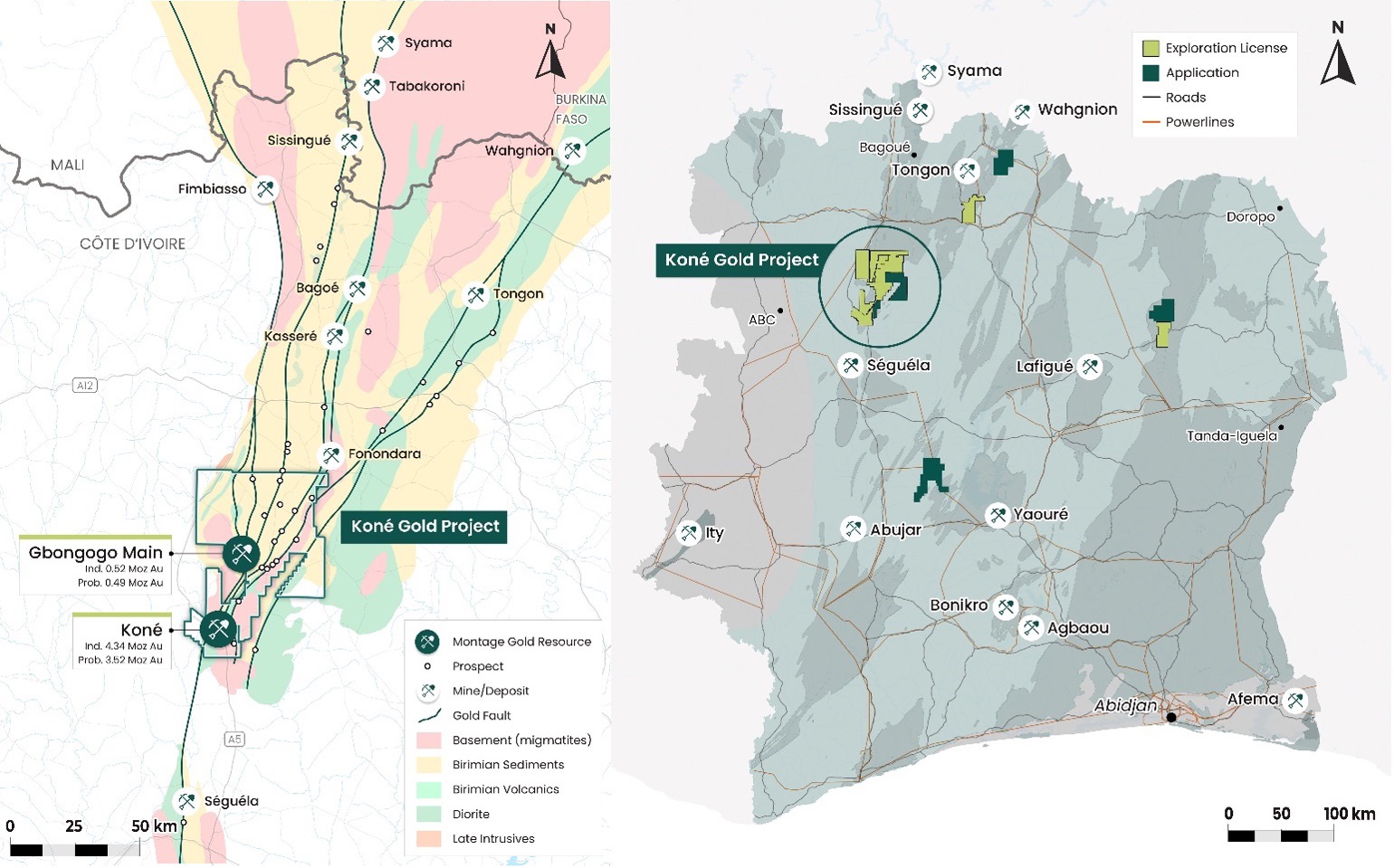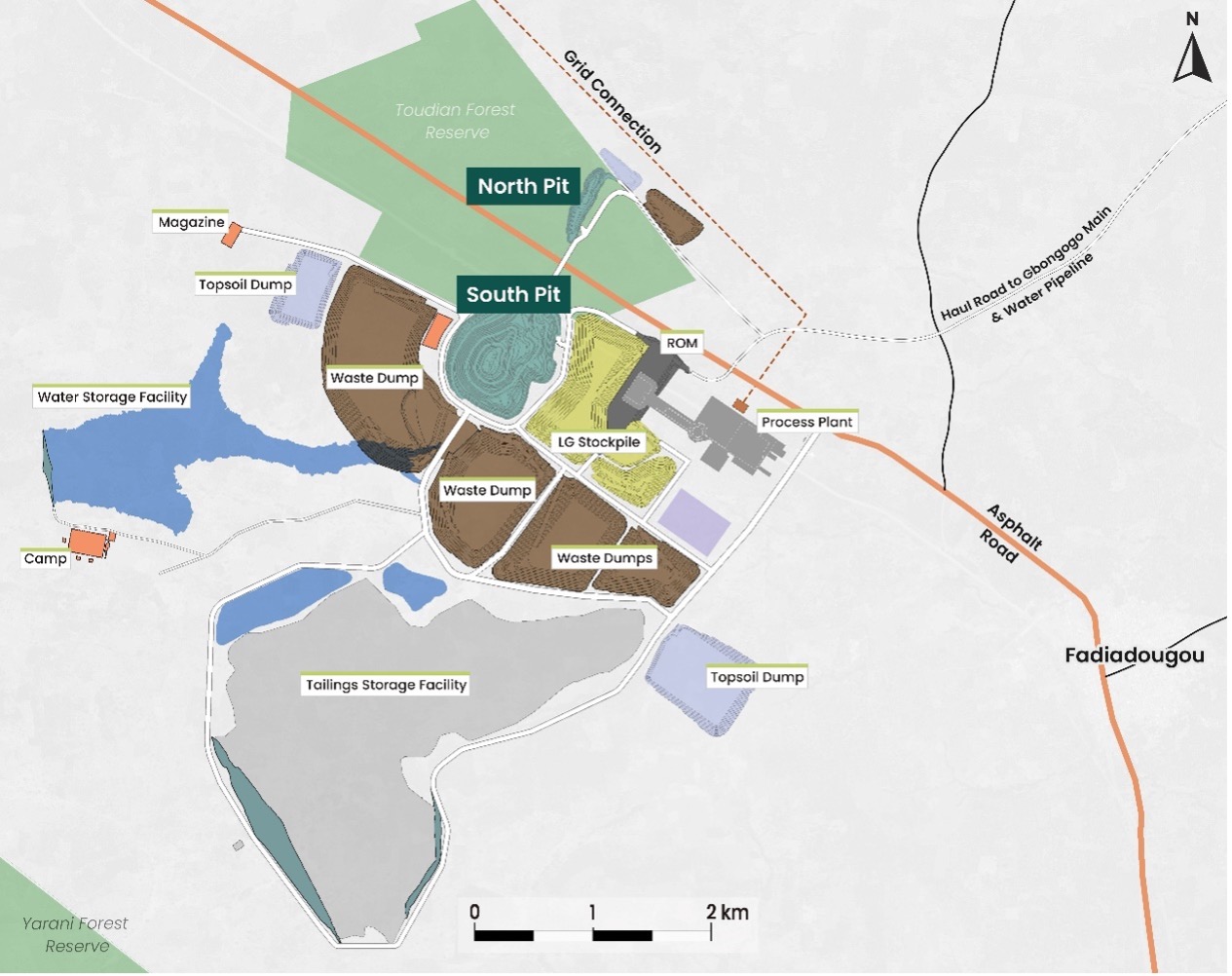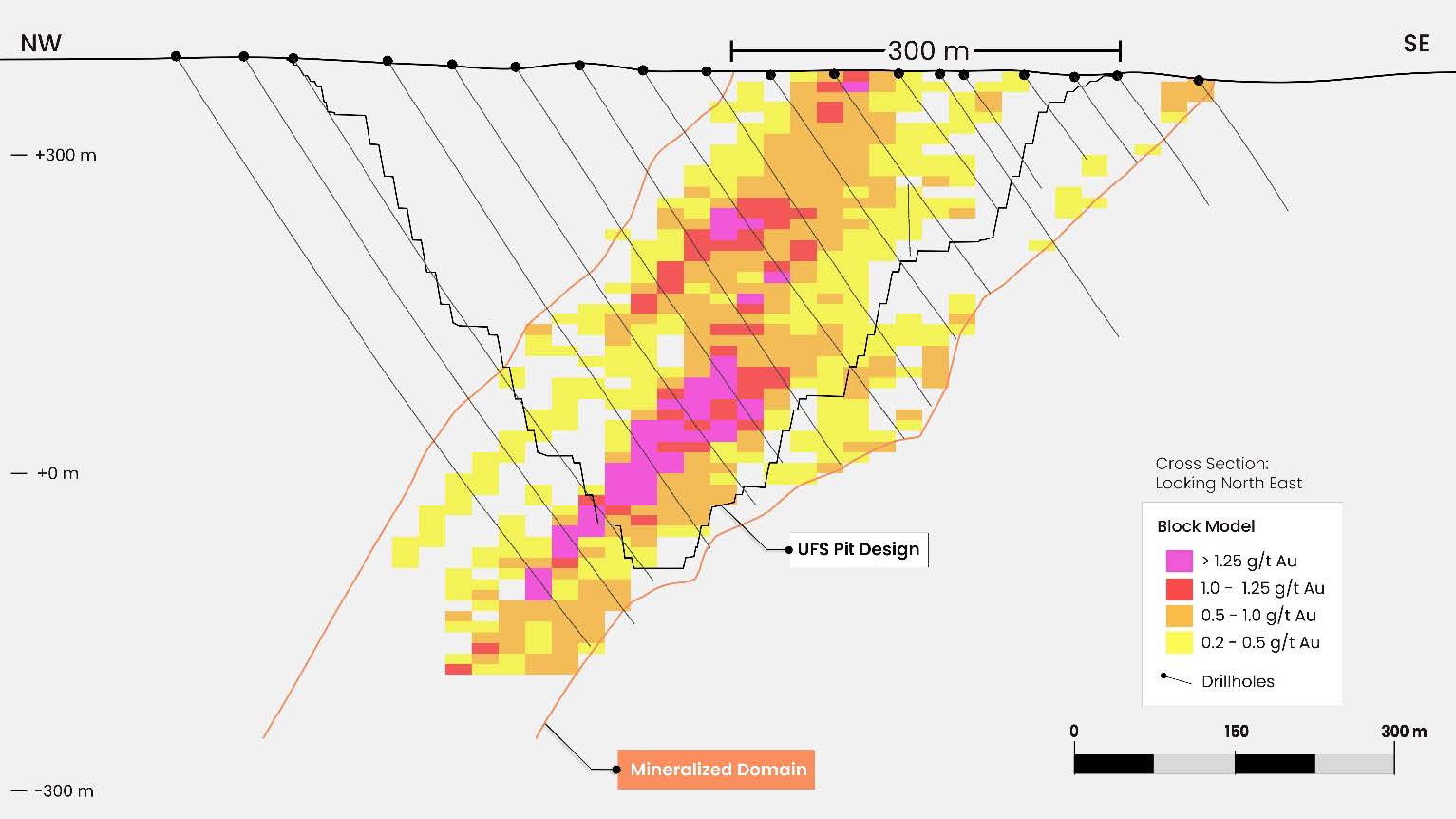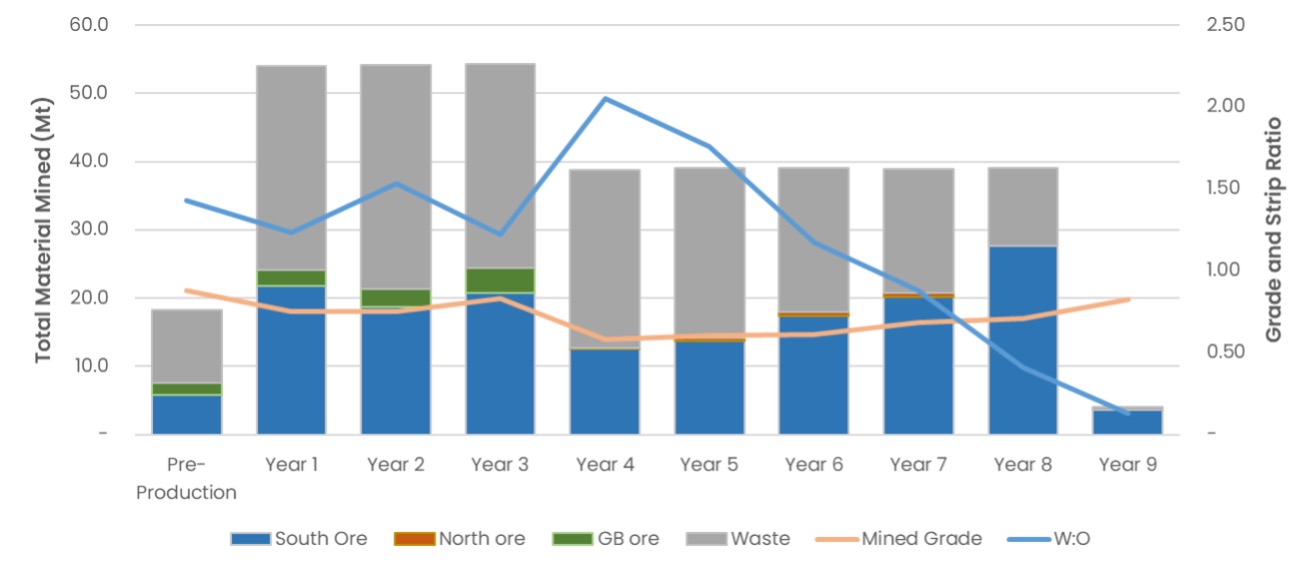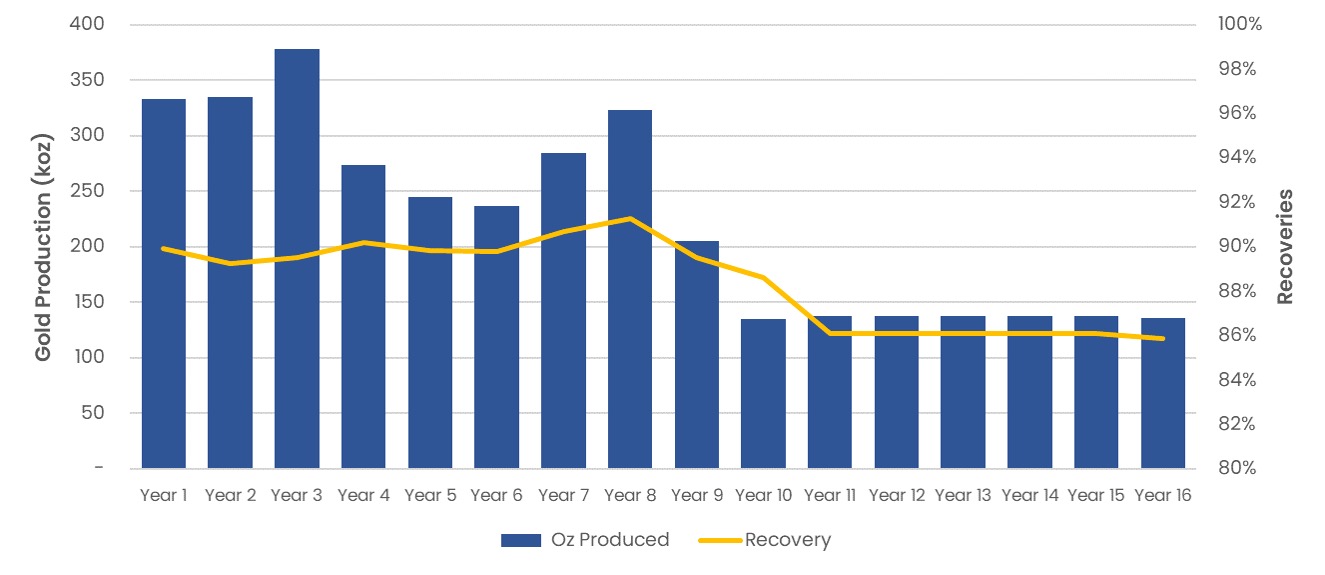Montage Announces Updated Feasibility Study at Koné Gold Project After-Tax NPV of $1.1B and 31% IRR and Two New Satellites to be Advanced
January 16, 2024
Vancouver, British Columbia — January 16, 2024 — Montage Gold Corp. (“Montage” or the “Company”) (TSXV: MAU) (OTCPK: MAUTF) is pleased to announce the results of the Updated Definitive Feasibility Study (the “UFS” or the “Study”) for the Koné Gold Project (“Koné Gold Project”, “Project”, or “KGP”) located in Côte d’Ivoire, which now incorporates ore from the Gbongogo Main satellite deposit. The UFS was prepared by Lycopodium Minerals Pty Ltd. in accordance with Canadian Securities Administrators’ National Instrument 43-101 Standards of Disclosure for Mineral Projects (“NI 43-101”). Please note that all financial figures in this press release are in United States dollars, unless otherwise noted.
Highlights
- Significant Reserves and Production – A New Gold District in Côte d’Ivoire
- 4.01Moz of Probable Mineral Reserves
- 3.57Moz of gold produced over a 16-year mine life
- Years 1-3: Avg. annual production of 349,000 oz at 1.15g/t avg. head grade
- Years 1-8: Avg. annual production of 301,000 oz at 0.96g/t avg. head grade
- Peak production of 378,000 oz in year 3
- Strong Financial Metrics – In an Increasing Cost Environment
- $1,089M after-tax NPV5% and 31% IRR at base case $1,850/oz gold price
- $1,456M after-tax NPV5% and 39% IRR at spot $2,050/oz gold price
- Years 1-3: Avg. AISC1 of $899/oz
- LOM AISC1 of $998/oz
- Capital payback period of 2.6 years
- Optimizations Maintain Capital Efficiency – Further Improvements Expected
- Pre-production capital requirement of $712M (vs $544M from 2022 DFS)
- $126M reduction in sustaining capital vs 2022 DFS
- Net increase in LOM total capital requirements of 5% compared to 2022 DFS
- Several areas identified to optimize pre-production capital
- Impact of Gbongogo Main Deposit
- Gbongogo Main represents 12% of Probable Reserves and contributes $350M in pre-tax net cash flow in first 3 years of operations
- Optimizes capital payback; demonstrates impact of satellite deposits
- Planned haul road opens 38km corridor for priority exploration
- KGP Construction Planned for Q4 2024
- Permitting process ongoing with all requisite approvals expected in Q3 2024
- Project financing process underway
- Drilling to Continue in January on Next Satellite Deposit Targets – Diouma North and Petit Yao
- Diouma North is located 2km south of Gbongogo Main and <500m from planned haul road
- Recent Diouma North drilling included: 17.45m at 2.75g/t, 11m at 2.21g/t and 14m at 2.16g/t
- Petit Yao is located 3km from planned haul road
- Previous Petit Yao results included: 12m at 4.15g/t, 6m at 10.82g/t, and 3m at 15.51g/t
Rick Clark, Montage CEO commented,
“The completion of the UFS for the Koné Gold Project is the culmination of a business plan of target identification, exploration, economic analysis and development assessment and represents the hard work, dedication, and expertise since 2009 of what is now the Montage team. I am extremely proud of what this team has accomplished at the KGP since this opportunity was first recognized by Hugh Stuart (President of Montage) while investigating growth projects for Red Back Mining in 2008-09.
“In the three years since Montage went public, we have evolved from an exploration company with a 1.5Moz Inferred Mineral Resource into a development company with Probable Mineral Reserves of +4Moz and total Indicated Mineral Resources of nearly 5Moz. The KGP is now positioned to become the largest gold mine in Côte d’Ivoire with an expected average gold production of 349,000 oz per year during the initial 3 years of operations at an AISC of less than $1,000/oz, leading to a short payback on capital of 2.6 years.
“The primary objective of the UFS was to optimize the economics of the Koné Gold Project by incorporating higher grade tonnes from Gbongogo Main. This change has materially de-risked the financial parameters of the Project and demonstrates the significant impact of discovering higher grade satellite deposits within the broad 2,259 sq. km property package held 100% by Montage. We will now focus on repeating this success as we advance the next near-term satellite deposits within the KGP, notably Diouma North and Petit Yao, both of which are in close proximity to the planned haul road.
“The success we have achieved to date with the Koné Gold Project highlights Côte d’Ivoire as a premier jurisdiction for gold exploration and development. The combination of the geological endowment of Côte d’Ivoire and the business focussed political will of the Government of Côte d’Ivoire, represents a formula for mining success. Côte d’Ivoire is a partner in every respect in the development of its natural resources and the Koné Gold Project is a perfect example of this. The construction of the KGP will be the largest investment in a gold project in Côte d’Ivoire to date and we look forward to working with the Government of Côte d’Ivoire to realize success for all stakeholders.”
A summary of operating and financial metrics from the UFS are presented in Table 1 below along with a comparison to the 2022 DFS. A summary model with annual projections over the project life has been included as Appendix 1 to this Release.
Table 1 – UFS Summary Metrics
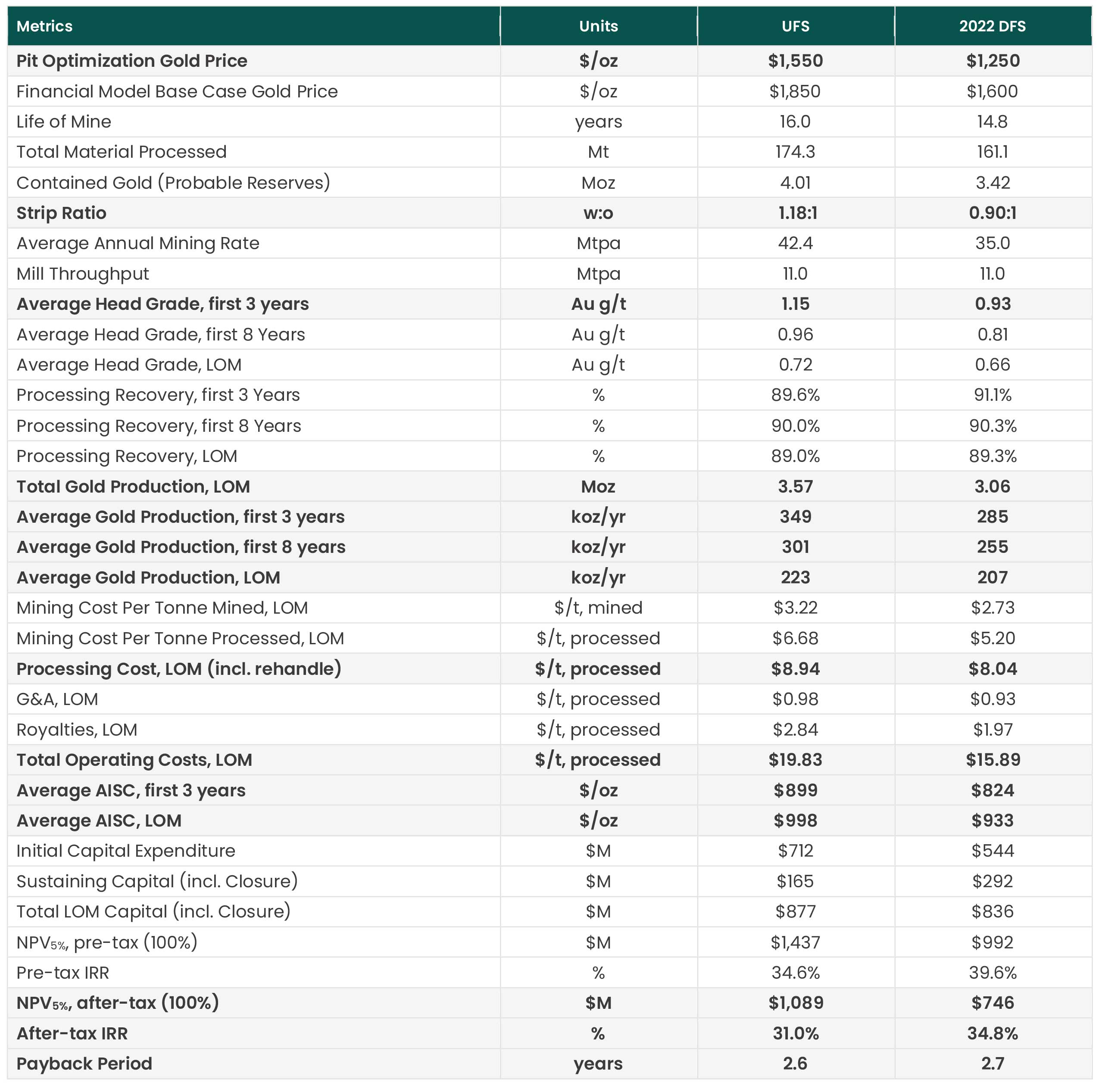
Details
Koné Gold Project Overview
The Koné Gold Project is located approximately 470km north-west of Abidjan, the commercial capital of Côte d’Ivoire. The Project comprises six exploration permits (PR262, PR748, PR842, PR879b, PR919 and PR920) covering 1,801 sq. km and two applications covering a further 456 sq. km, for a combined total of 2,259 sq. km.
The communities of Fadiadougou and Batogo lie 5km east and west respectively of the Koné resource area and the village of Gbongogo is located 4km north-west of the Gbongogo Main resource. The village of Dolourogoukaha will be impacted by the development pf the Gbongogo Main pit and will be resettled outside the affected area. Beyond this, the Project area is largely devoid of habitation with subsistence farming and cashew plantations being the dominant land use.
The nearest major centre is Séguéla, 80km to the south. The Project area is accessible year-round with an asphalt highway within 300m of the proposed plant location.
Figure 1: Location of Koné Gold Project
Drilling to Start in January at Next Satellite Deposit Targets
Exploration during Q4 2023 focussed on continued assessment of the numerous targets within the KGP covered by the program in H1 2023 and several new areas of artisanal mining activity.
A key priority area is Diouma-Gbongogo-Korotou shear zone (Figure 2), a 15km strike length of soil anomalism, artisanal mining and 9 targets drilled to some degree, with the Gbongogo Main pit and planned haul road located at the south end.
In addition, Montage will be re-starting exploration at the Petit Yao target which sits 7km east of Koné and just 3km southeast of the planned haul road.
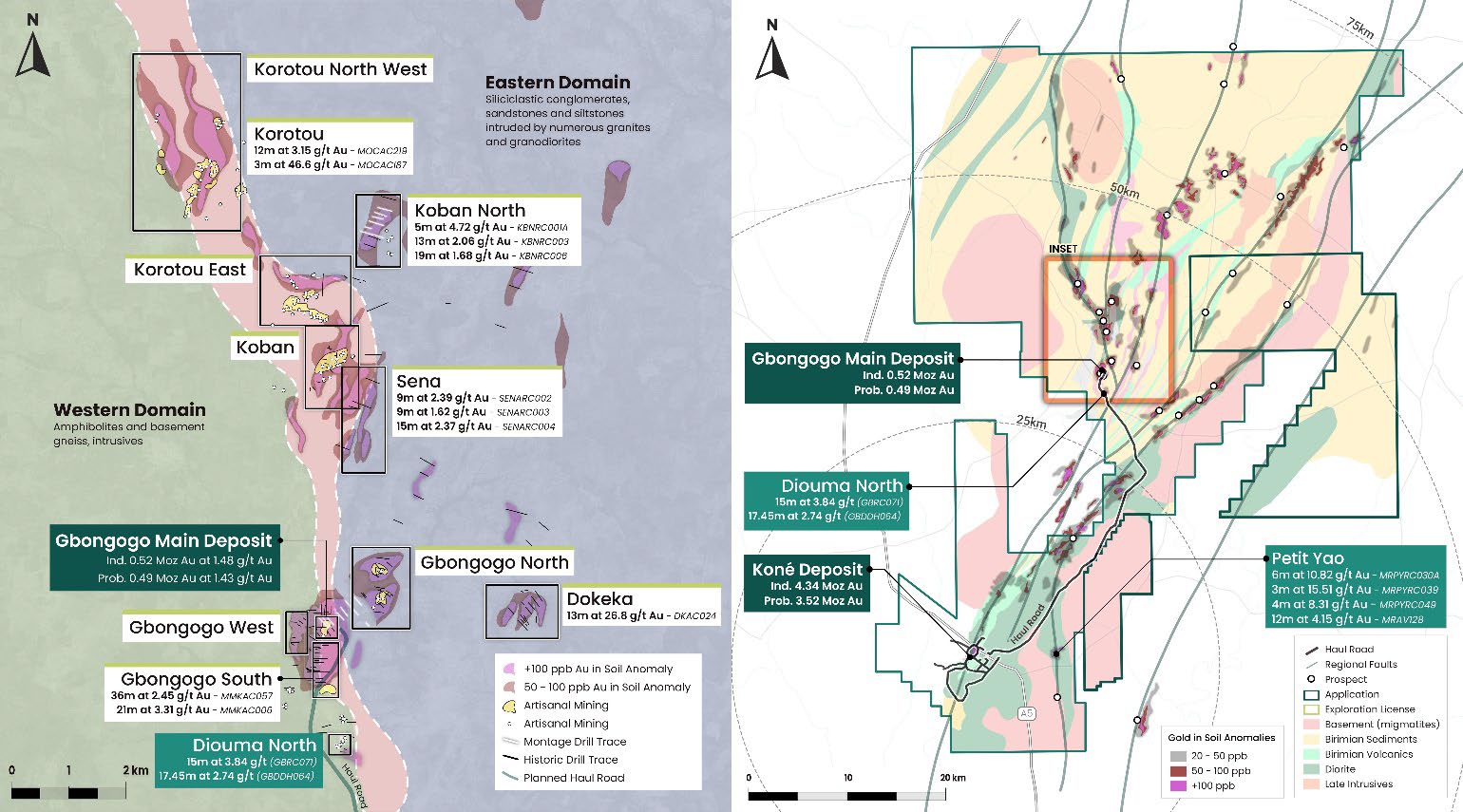
Figure 2: Diouma-Gbongogo-Korotou Shear Zone and District Target Areas
The Diouma North prospect is located 2km south of Gbongogo Main, and less than 500m from the planned haul road. As follow-up to reconnaissance and RC drilling in early 2023, Montage completed three diamond core holes, with highlight intercepts including: 14m at 2.16g/t from 58m (GBDDH062); and 17.45m at 2.74g/t from 79m and 11m at 2.21g/t from 127m (GBDDH064). Diamond drilling at Diouma will re-commence by the end of January with an initial core programme which, if successful, will be followed up with an RC programme with the aim of defining an initial resource by mid-2024. Results presented in Table 2 below represent intercepts that have intersected the targeted mineralized area. A complete set of previously unreleased results is included in Appendix 2 of this press release.
Table 2: Highlight Drill Results from Diouma North
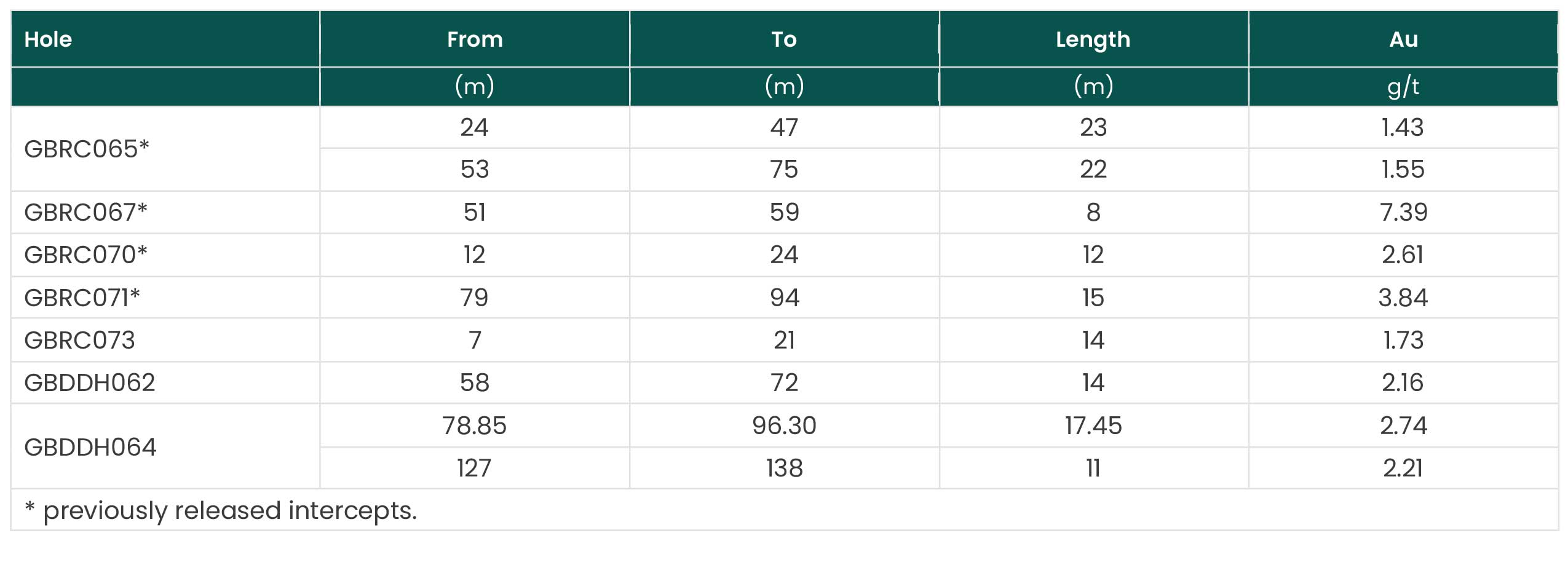
The Petit Yao target sits approximately 7km east of the Koné deposit and 3km southeast of the planned haul road. It was first identified in late 2019 by Montage geologists recognizing prospective volcanic rocks in an area previously assumed to be un-prospective. Drilling completed at Petit Yao includes 3,392m of RC and 681m of shallow aircore, with highlight intercepts shown in Table 3 below.
Table 3: Highlight Drill Results from Petit Yao

In H1 2022, an IP survey was completed over Petit Yao, which clarified a strong northwest trend to the underlying geology and has resulted in a re-interpretation which now extends over a strike of approximately 900m. This new interpretation will be drill tested in Q1 2024.
Mineral Resources and Reserves Estimates
Recoverable Mineral Resources were estimated for the Koné and Gbongogo Main deposits by Matrix Resource Consultants Pty Ltd. using Multiple Indicator Kriging (“MIK”).
Koné Deposit
The Mineral Resource Estimate (“MRE”) for the Koné deposit has been re-stated based on an optimal pit shell generated using cost inputs in line with the UFS and a gold price of $1,800/oz with an effective date of 19 December 2023.
Table 4 shows the Indicated and Inferred Mineral Resource estimates at a range of cut-off grades.
Table 4 – Koné Mineral Resource Estimate
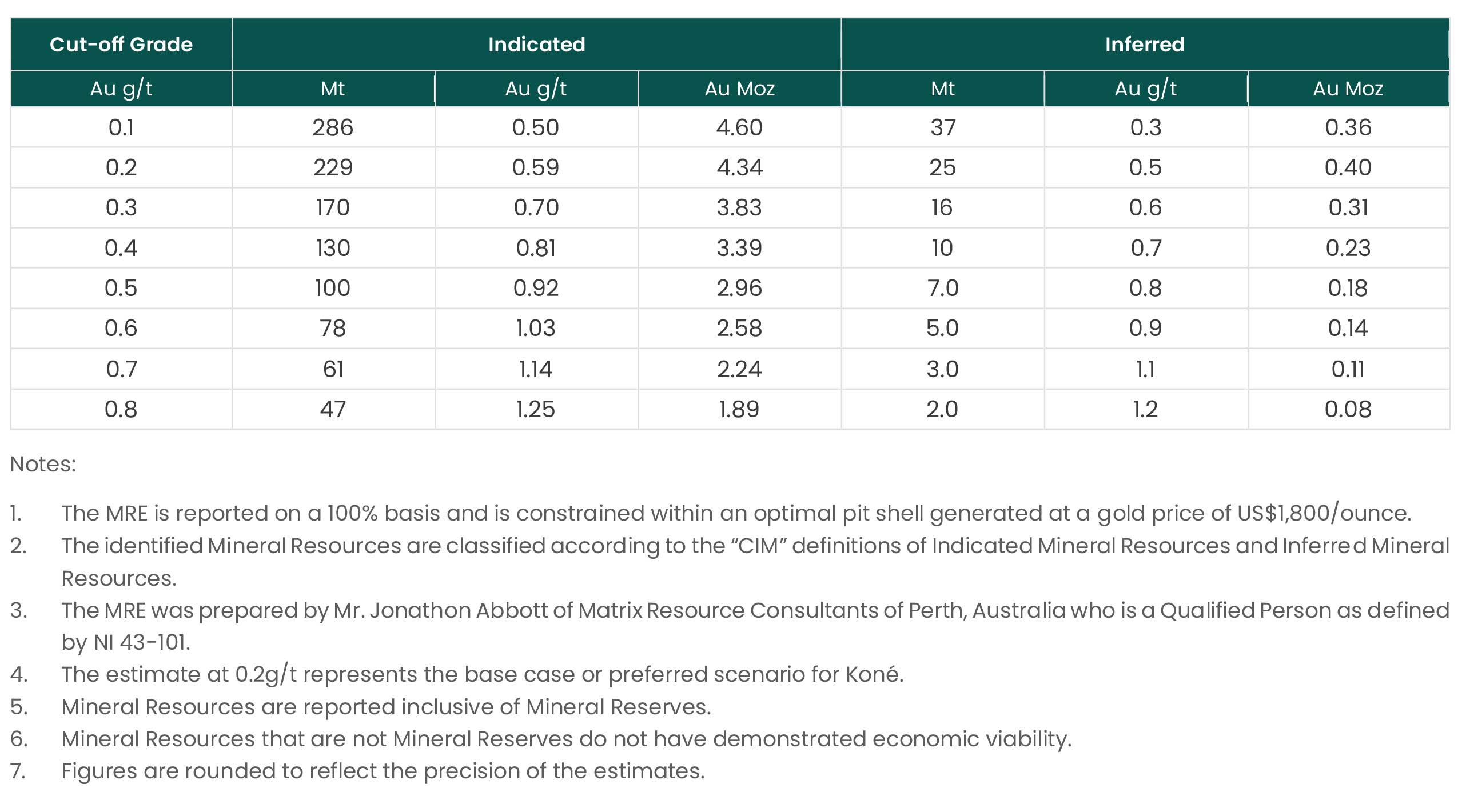
Gbongogo Main Deposit
The Mineral Resource Estimate (“MRE”) for the Gbongogo Main deposit is constrained within an optimal pit shell generated using cost inputs in line with the UFS and at a gold price of $1,800/oz with an effective date of 19 December 2023.
Table 5 shows the Indicated and Inferred Mineral Resource estimates at a range of cut-off grades.
Table 5 – Gbongogo Main Indicated Mineral Resource Estimate
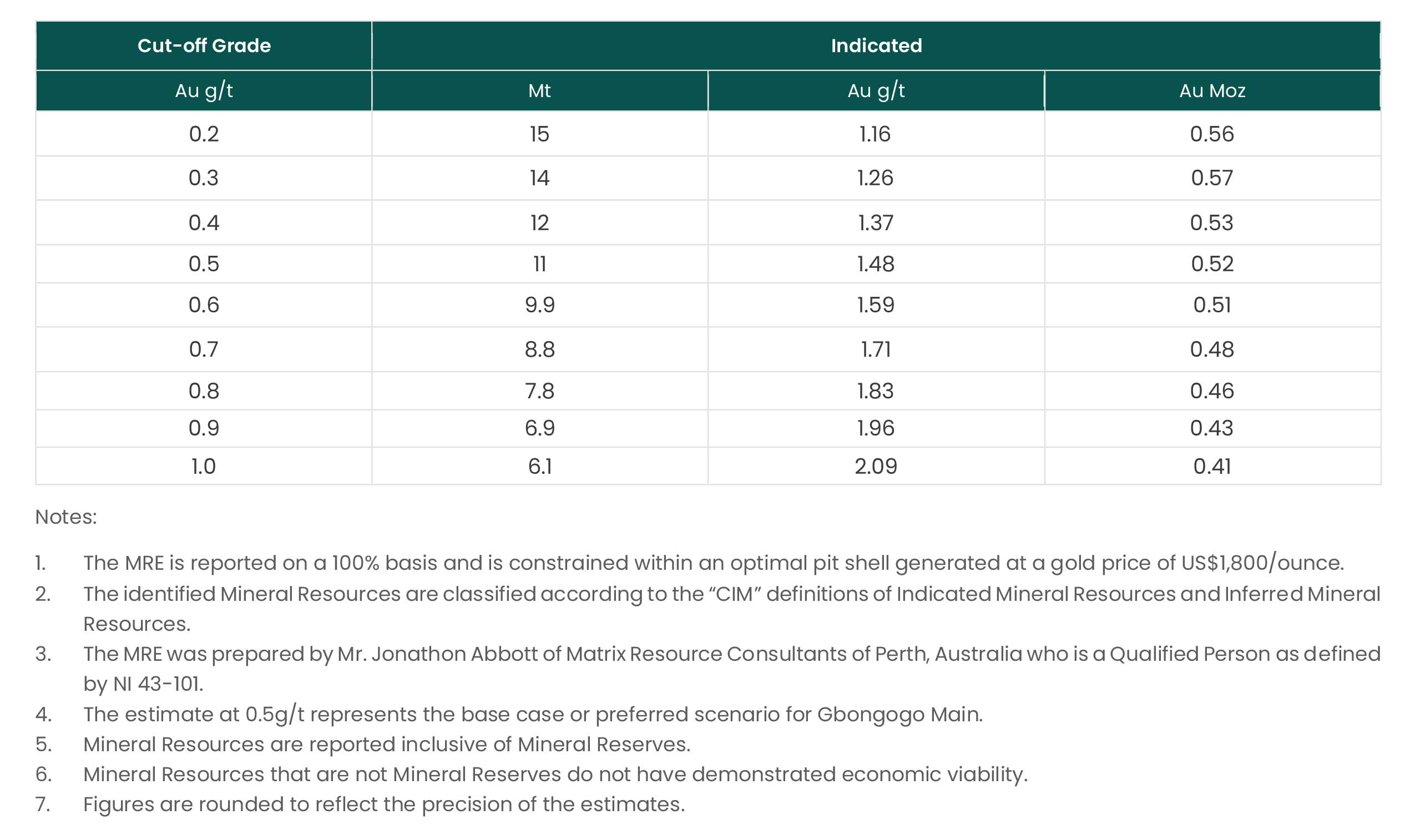
Combined Resources
Table 6 shows the combined resources based on the preferred cut off grades for each deposit.
Table 6 – Combined Resources

The Mineral Reserve estimate was prepared by Carci Mining Consultants Ltd., dated as of January 15, 2024 and is presented below in Table 7.
Table 7 – Mineral Reserve Estimate
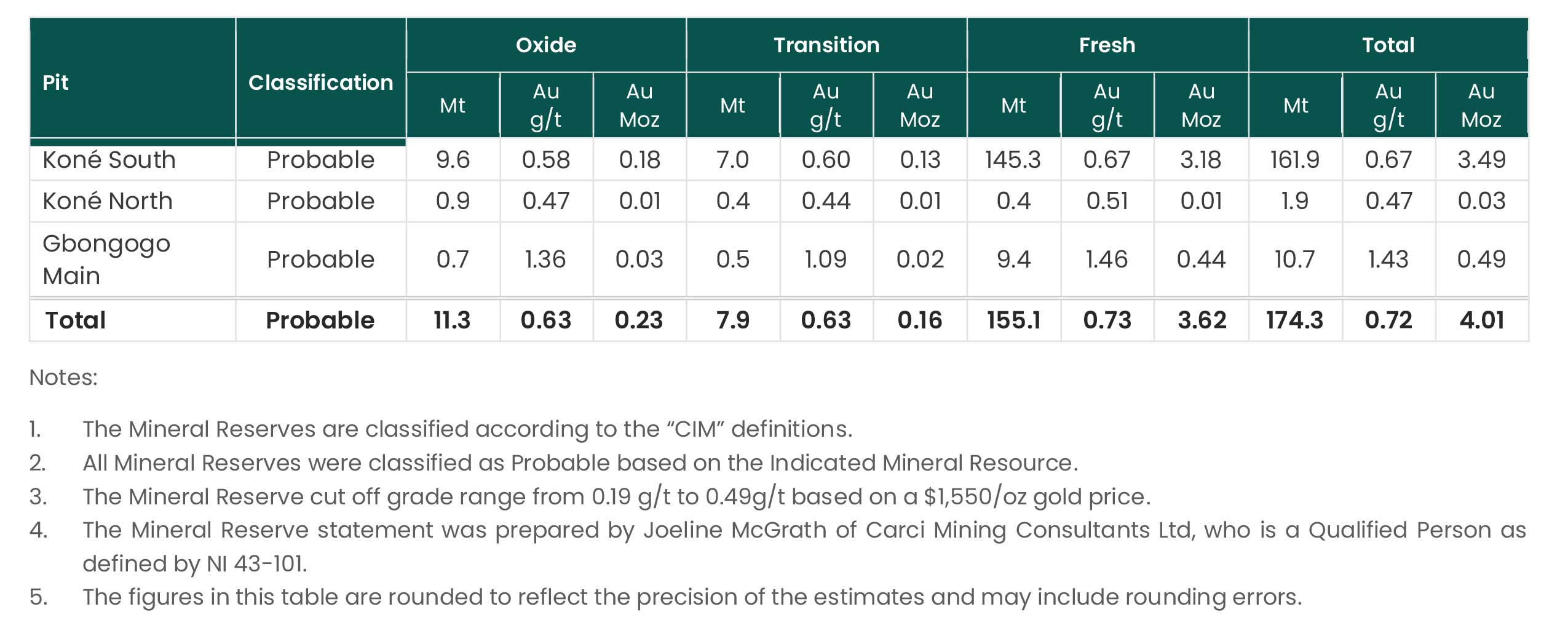
Updated Definitive Feasibility Study Overview
The UFS is based on three open-pit gold deposits feeding a central gold processing facility (Figure 3). The Project will produce an average of 223,000 ounces of gold per year over the life of the mine. The initial life of the Project is 16.0 years. There is upside potential through regional exploration and identification of satellite pits similar to Gbongogo Main that could be mined and trucked to a central processing facility.
Initial capital to fund construction and commissioning is estimated at $712.1 million with total capital estimated at $877.5 million over the LOM including closure costs. All-in sustaining costs1 are estimated at $899 per ounce during the first three years of the Project, well below the current industry average, and $998 per ounce over the life of the Project. Processing costs of $8.35/t position the Project to be able to take advantage of mining satellite pits identified through ongoing exploration.
The financial analysis performed from the results of this UFS demonstrates the economic viability of the Koné Gold Project using the base case gold price assumption of $1,850 per ounce. This results in an after-tax net present value cashflow at a 5% discount rate (NPV5%) of $1,089 million and an after-tax IRR of 31.0% (both on a 100% basis) with a 2.6 year payback.
The Company is highly confident that there are additional opportunities to further strengthen the Project through the continued drilling and testing of satellite targets and optimizing efficiencies on select capital costs.
The study was prepared for Montage by Lycopodium Minerals Pty Ltd. Other discipline specific consultants were:
| Mineral Resource Estimate: | Matrix Resource Consultants Pty Ltd. |
| Metallurgical Testwork: | SGS Lakefield |
| Metallurgical oversight: | MPH Minerals Consultancy Ltd. |
| Tailings and Water Storage: | Knight Piésold Pty Ltd. |
| Hydrogeology: | Australasian Groundwater & Environmental Consultants |
| Environment: | Mineesia Ltd. |
| Mineral Reserve Estimate & Mining: | Carci Mining Consultants Ltd |
Key Differences in Project Scope Compared to 2022 DFS
As part of the recent feasibility review and process, several areas of the Project were re-evaluated:
- The mine plan now incorporates the mining of the Koné South and Gbongogo Main pits simultaneously at the start of operations to maximise grade and economics during the payback period.
- The power will now be supplied via a grid connection. This change was made due to the lack of reliable LNG supplies in the country and the high cost of importing LNG.
Figure 3: Koné Gold Project Site Layout
Mining
Mining operations will be carried out by a contractor on a unit cost per tonne basis utilising a mining fleet comprised of 90t rigid body haul trucks with suitably sized loading units at a rate of 39Mtpa at Koné and 15Mtpa at Gbongogo Main, respectively. The grade of the processed material in the first eight years is enhanced by using an elevated cut off grade to the plant and stockpiling the lower grade material for later processing.
Pit optimizations were completed based on slope angle recommendations from SRK Consulting:
- for Koné South 48° for oxide, 68° for transition and 68° for fresh rock; the overall slope angle inclusive of ramps and berms is approximately 55°.
- for Gbongogo Main 32° for oxide, 40° for transition, and from 43° to 55° for fresh rock, which is reduced in areas of unfavourable bedding to 35°; the overall slope angle inclusive of ramps and berms is approximately 43°.
The optimizations were run using estimates of processing cost and recovery data for each domain. Mining costs were broken into base and incremental mining costs, derived from competitive bids received from West African mining contractors.
A gold price of $1,550/oz was used for the optimisation along with the following royalty assumptions: i) a sliding scale royalty payable to the government of Côte d’Ivoire, 4.0% at $1,550/oz Au; ii) a 2% property royalty; and iii) a 0.5% community development fund royalty.
Pit designs (Figure 4 and Figure 5) were completed for the Koné and Gbongogo Main deposits which will be exploited through three pits, a smaller Northern pit which reaches a depth of 70m, a larger Southern pit which extends to a depth of 495m, and the Gbongogo Main pit which extends to a depth of 220m.
The overall strip ratio of the Project is 1.18:1; the Koné South, Koné North and Gbongogo Main pits have strip ratios of 1:01, 1.19 and 3.77, respectively.
Figure 4 – UFS Koné South Pit Design
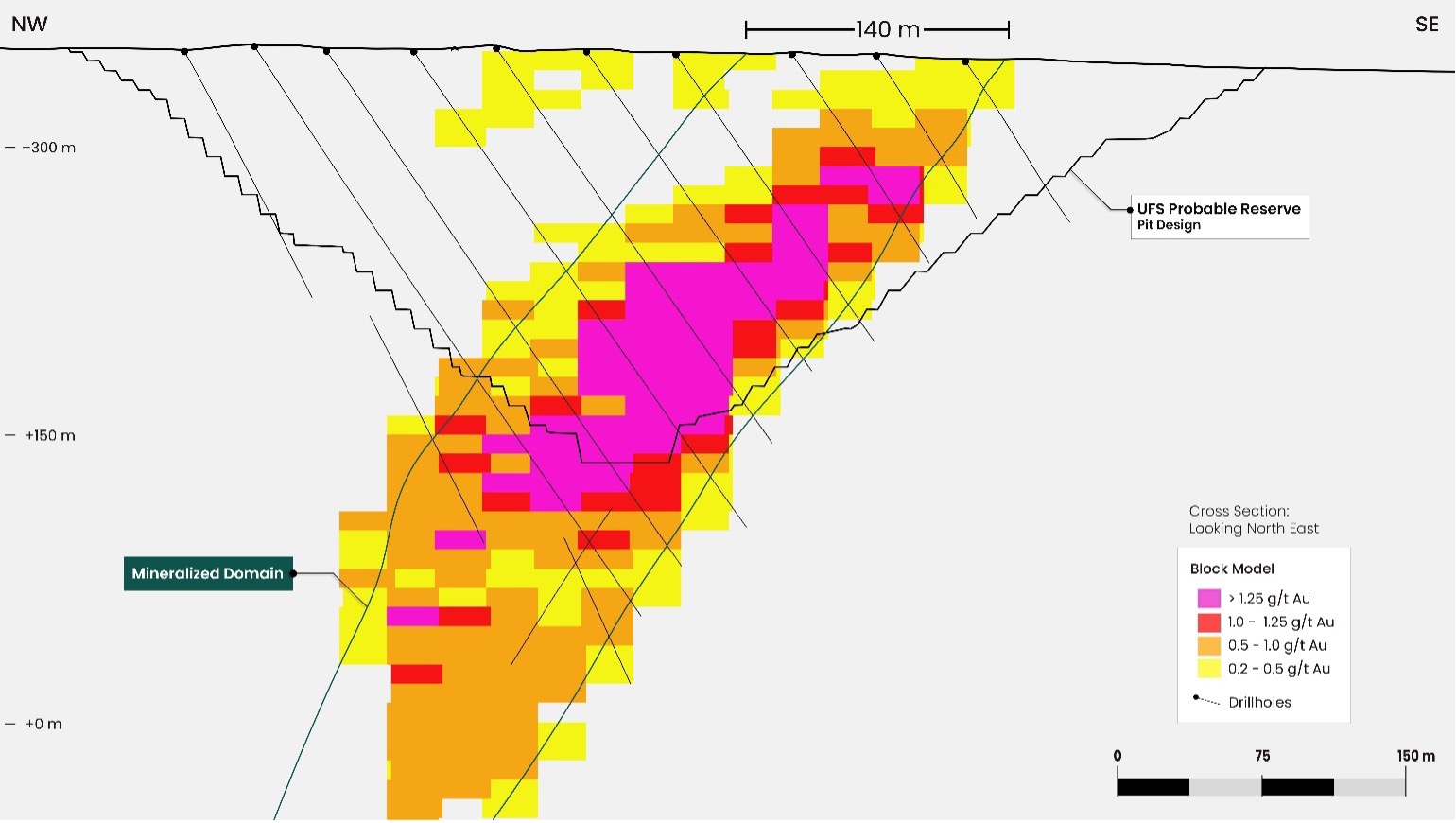
Figure 5 – UFS Gbongogo Main Pit Design
Figure 6 shows the mine schedule and Figure 7 shows the processing schedule with the higher-grade feed material being processed during the first eight years of the mine life. Stockpiled lower grade material will be processed after the completion of mining operations.
Figure 6 – Mining Schedule
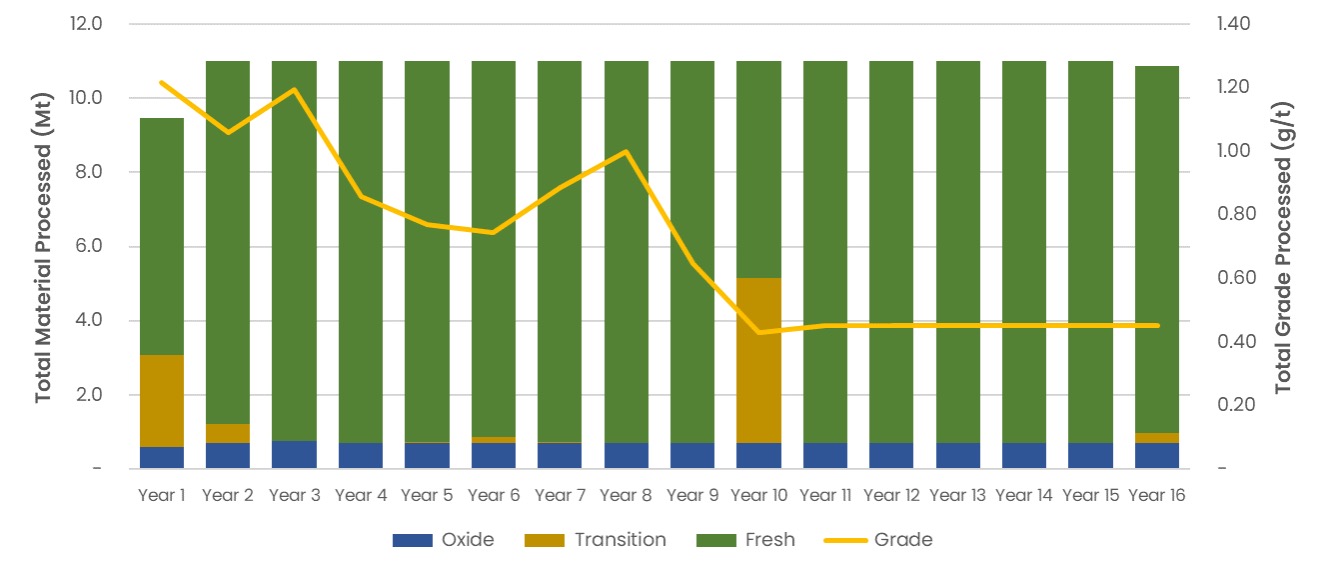
Figure 7 – Processing Schedule
Figure 8 shows forecasted gold production and processing recoveries. The Koné South pit will be used for the deposition of tailings generated during the last 7 years of processing.
Figure 8 – Annual Gold Production and Recoveries
Metallurgy
A comprehensive testwork program was carried out by SGS Lakefield on 68 comminution and 146 leach optimization and variability samples representing a range of material and rock types at the Koné and Gbongogo Main deposits.
The testwork program demonstrated that the mineralization is amenable to direct tank carbon in pulp cyanide leaching with good gold recoveries, low reagent consumptions and medium-low resistance to grinding, providing favourable processing economics and a simple flowsheet.
Table 8 shows the forecast gold recoveries and reagent consumptions at the average LOM grades. Forecast gold recoveries were estimated based on variable residue grades related to feed grade, a solution loss of 0.005mg/l gold and carbon fines loss of 0.15%.
Cyanide consumption is low to very low and lime consumption is low for the dominant fresh material (90%), but higher for the less dominant transition (4%) and oxide (6%) zones.
Table 9 shows the comminution results. The fresh mineralization is soft in terms of resistance to ball milling and crushing with medium abrasivity. A full suite of High-Pressure Grinding Rolls (HPGR) testing has been completed on a Koné Fresh ore sample and Static Pressure Testing two Koné Footwall Fresh ore samples. The (HPGR) investigation included: batch testing and a locked-cycle test, the Bond ball mill grindability test on both the HPGR feed and HPGR product and the SPT test. The HPGR test results have been supplemented by Semi Autogenous Grinding (SAG) mill test data in the design of the HPGR.
Table 8 – Metallurgical Testwork Summary
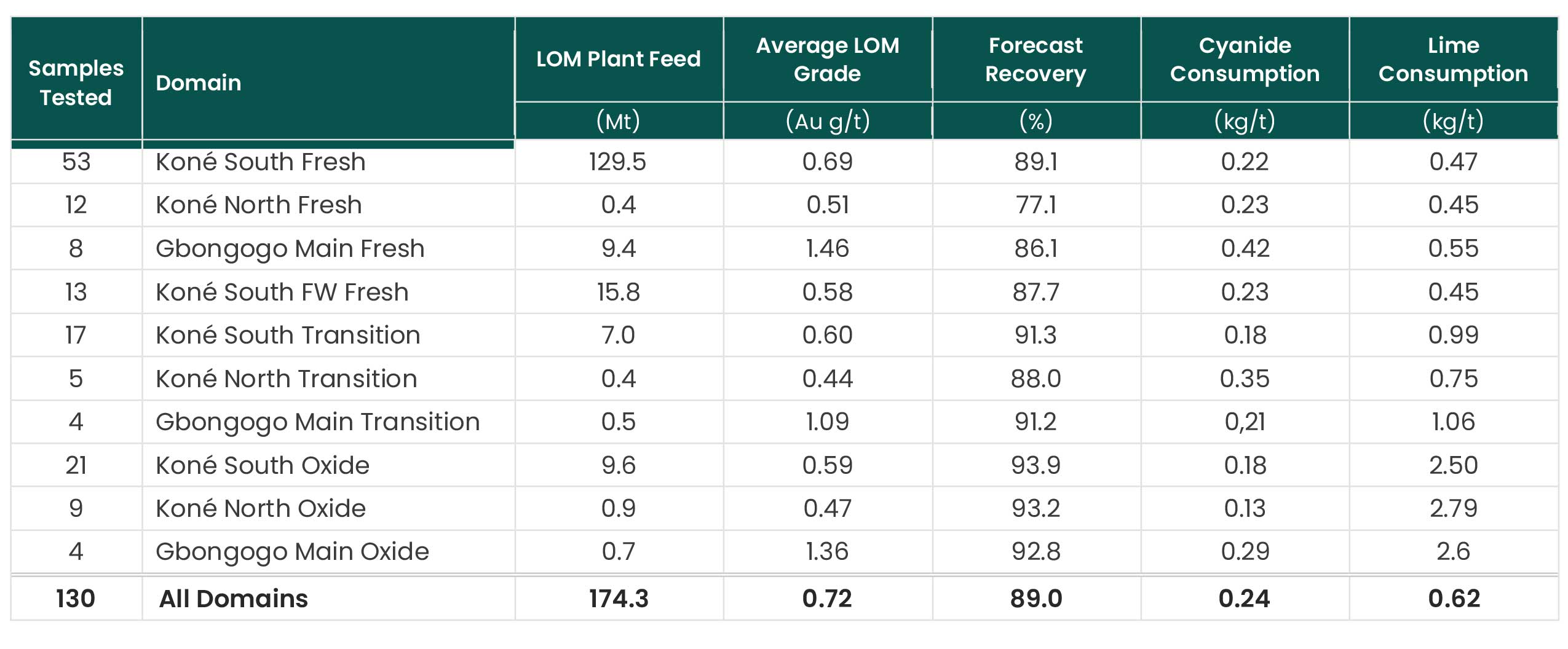
Table 9 – Comminution Testwork for Fresh Rock

Process Plant
The process plant design is based on a simple and robust metallurgical flowsheet designed for optimal precious metal recovery. The key design criteria for the plant are:
- Nominal throughput of 11.0 Mtpa with a grind size of 80% passing (P80) 75 µm.
- Process plant availability of 91.3% supported by the selection of standby equipment in critical areas.
- The treatment plant design incorporates the following unit process operations:
- Primary and closed-circuit secondary crushing using a gyratory crusher and two cone crushers to produce a crushed product size P80 of approximately 31mm.
- A crushed feed stockpile with a nominal live capacity of 22,000 wet tonnes, providing buffer storage of crushed ore with continuous reclaim feeders for the HPGR-ball mill comminution circuit.
- Two parallel HPGRs in closed circuit with wet sizing screens, with undersize slurry reporting to the milling circuit via the cyclone feed hopper. Two parallel trains of ball mills in closed circuit with hydrocyclones to produce a grind size of P8075 µm.
- Pre-leach thickening to increase the slurry density feeding the leach and carbon in pulp (“CIP”) circuit to minimise tankage and reduce overall reagent consumption.
- Leach circuit incorporating 14 leach tanks, arranged in two parallel trains of 7 each in series, to provide 36 hours leach residence time, and equipped with external oxygen contactors.
- A Kemix Pumpcell CIP circuit consisting of eight tanks for recovery of gold onto carbon, to minimize carbon inventory, gold in circuit and operating costs. The CIP and elution circuit design is based on daily carbon harvesting.
- 20 tonne elution circuit, electrowinning and gold smelting to recover gold from the loaded carbon to produce a gold/silver doré.
- Tailings thickening to recover and recycle process water from the CIP tailings.
- Tailings pumping to the Tailings Storage Facility (“TSF”).
Project Infrastructure
Haul Road from Gbongogo Main to Koné
The Gbongogo haul road is 38.1 km in length and transverses a sparsely populated area between the two sites and has been designed to avoid villages, defined forest areas and minimise interactions with existing public roads. The road incorporates a pedestrian corridor leading to underpasses along the alignment. Access to the road will be restricted by construction of safety berms along the entire length of the road. Traffic control will be provided at all intersections with the public roads.
The haul road alignment has been designed to limit the number of water courses impacted by the road with culverts provided at all main water intersections and a bridge to be constructed at the crossing of the Marahoué River.
Water
Water will be sourced from the nearby Marahoué river, from pit dewatering and a supplementary borefield.
The river abstraction facility will be constructed adjacent to the Marahoué River bridge approximately 26 km north of the water storage facility (“WSF”). The extraction facility will comprise a sump to allow for harvesting of water by a pump mounted on a bridge support column. Pumping will only take place in the wet season, normally from June to December, provided minimum flows are met. Hydrological assessment of the river catchment indicates that the river will have sufficient excess flow during this period and will not affect downstream users.
Harvested river water and pit de-watering will be pumped to an off-stream WSF. Surface runoff from the Koné mining area, ROM pad and stockpiles will gravity flow to the WSF. The WSF will have a capacity of approximately 7.2 million m3 and will enable accumulation of water during the wet season and a gradual drawdown in the dry season. In addition, water will be recycled from the tailings storage facility to the process water pond. Surface runoff from the Gbongogo mining area, will be collected in two sediment ponds and overflow to the Marahoué river following sediment settling.
Tailings
The TSF will comprise of a single cell confined by a cross valley embankment which will be raised annually until the mining in Koné South pit is completed early in year 9.
The TSF basin will be lined with HDPE within the normal operating pond areas and a compacted soil liner elsewhere to reduce seepage. In addition, a system of underdrainage, embankment drainage and sub-liner drainage will be constructed to reduce seepage and aid consolidation of the tailings. Tailings will be deposited subaerially with the supernatant pond located away from the embankment. Water will be recovered from the supernatant pond by a suction pump with floating intake located in a channel excavated adjacent to an access causeway.
Following the completion of the mining early in year 9, tailings will be deposited into the Koné South pit via four spigots located around the perimeter of the pit. Water will be extracted from the decant pond using floating intake lines to position the pumps above the pond elevation. The pond volume will be at its highest at the first year as the TSF pond will be pumped to the pit to let the TSF commence the closure process.
The TSF will be closed and rehabilitated after deposition is transferred to the pit. Closure spillways will be formed to prevent water accumulating on the facilities and a waste rock cover will be placed over the tailings prior to topsoiling and revegetation.
Power
The UFS evaluated hybrid power supply options from proposals received from West African power providers. However, local supplies of LNG cannot be guaranteed and so power will now be supplied from the National Grid via a new 225kV transmission line.
The Koné Gold Project process plant is estimated to have a maximum demand of 44.8 MW and an average annual demand of 37 MW, with an expected energy consumption of 303GWhr/yr.
The capital cost estimate for grid connection is estimated to be $26M (before contingency). The operating cost is estimated at $0.1149/kWhr.
Environmental
Under the Mining Code, all applicants for an exploitation licence must submit an Environmental and Social Impact Assessment (“ESIA”) to the Agence Nationale de L’Environment (“ANDE”), the authority in charge of supervising, validating and controlling environmental impact studies. Montage submitted the ESIA in December 2023. There are currently no objections to the development of the Project.
Mining of the Koné North Pit will affect less than 10% of the Toudian Forest Reserve and discussions with the Ministry of Water and Forests have commenced to obtain authorization. The impact of the project on the forest reserve has been assessed during the ESIA. The UFS includes provision for the backfilling and re-habilitation of all but 14ha during operations. This will be complemented by a forest management plan in collaboration with relevant government agencies to ensure the upgrade and protection of the forest reserve.
Permitting
The development of the Project will be subject to the following permitting process:
- Approval of the ESIA by ANDE.
- Receipt of environmental approval of its design and environmental management program.
- Application for and receipt of a Mining Permit (valid for 10 years and then renewable).
- Negotiation of a Mining Convention.
ANDE hosted a public enquiry in late December 2023 and expect environmental validation of the project to be completed in Q1 2024. In parallel with this process, Montage is preparing the Mining Permit application and initiating discussions in respect of the Mining Convention, all with assistance from local advisors. Based on current expectations, Montage believes it will receive final permits and approvals in Q3 of 2024.
Capital Costs Summary
Capital cost estimates are summarized in Table 10 and Table 11. The initial project capital cost is estimated at $712.1M, including a contingency allowance of $65.3M.
Table 10 – Pre-Production Capital Cost Estimate Summary (Q4’23, +15/-10%)
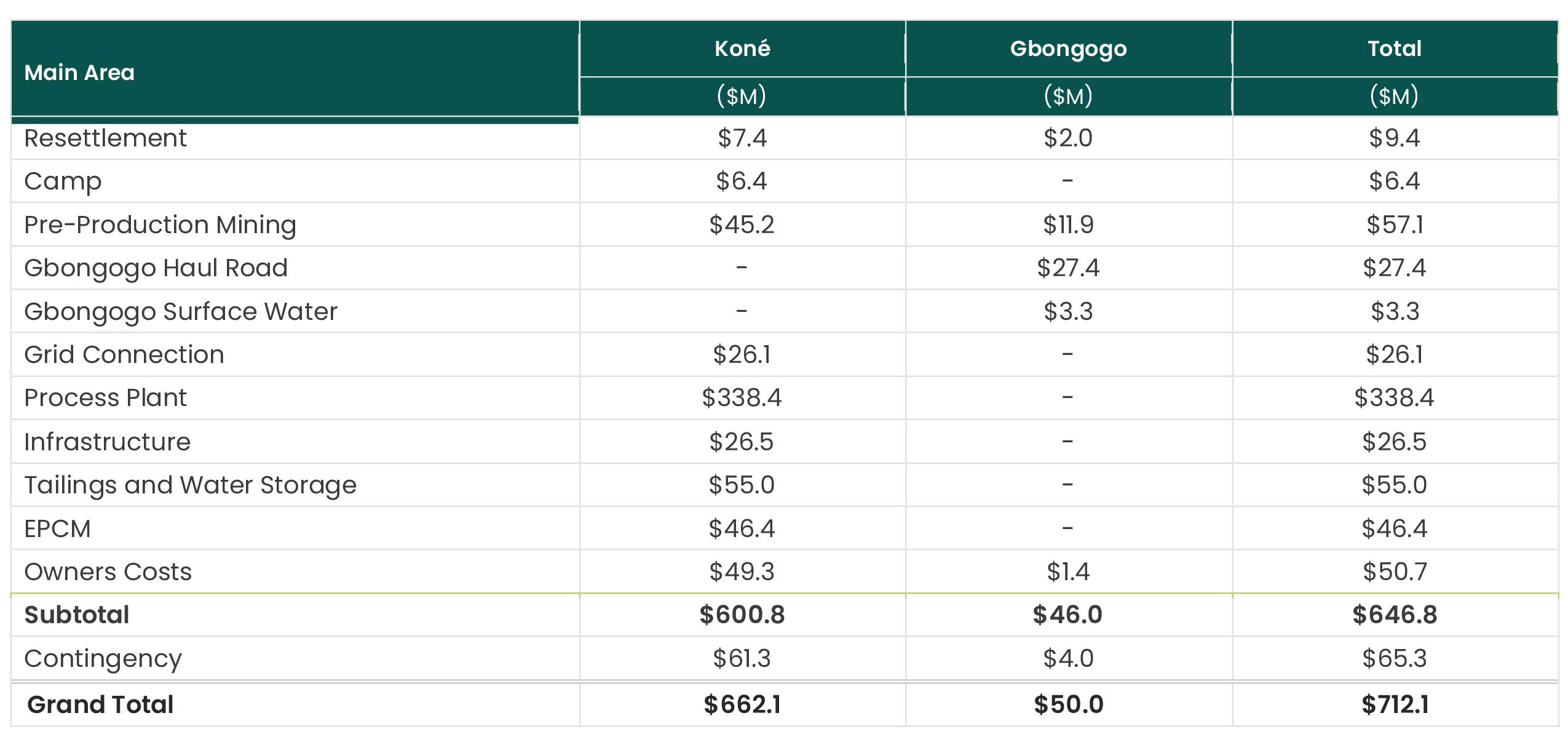
Compared to the 2022 DFS and excluding capital costs associated with Gbongogo Main, the Koné pre-production capital cost has increased by $118.3M (including contingency). The significant increases are in the following areas:
- Grid connection $28M
- HPGR and ball mills $24M
- Owners’ costs $19M
- Reagent supply $7M
- EPCM $7M
- WSF design upgrade $4M
- Feed preparation $3M
- General inflation $24M
The Gbongogo Main infrastructure costs add a further $50.0M.
The duration of the detailed design and construction phase of the Project has been estimated to be 31 months commencing with the construction of the Marahoué bridge, road and pump station and the WSF. The plant is estimated to take 27 months to construct. Mining will commence 12 months prior to start of processing.
The total LOM capital cost is estimated at $877.4M, including sustaining capital and closure costs of $165.3M, as shown in Table 11.
Table 11 – Sustaining Capital Cost Estimate Summary (Q4’23, +15/-10%)

Sustaining capital estimates have decreased by $126.4M compared to the 2022 DFS, primarily due to the change in power supply from LNG to a grid connection.
Taken as a whole, these changes have resulted in a $65/oz increase in LOM AISC¹ versus the 2022 DFS.
Operating Costs Summary
Contract open pit mining costs were derived from a tender process involving several West African mining contractors who were provided a detailed mining plan for the Koné and Gbongogo Main deposits. The average open pit operating cost ($/t mined) is shown in Table 12. A diesel price of $1.00/l was used.
Table 12 – Mining Costs (Q4’23)

Process operating costs have been developed for each major domain. Operating costs were developed using the plant parameters specified in the process design criteria. Table 13 presents the operating cost summary by material type. In addition to the processing costs, rehandle costs equate to $0.59/t processed when averaged over the LOM.
Table 13 – Process Operating Cost per Material Type (Q4’23, +15/-15%)

Total fixed mine level general and administration (“G&A”) costs are estimated at $12.1M annually, which are in addition to the $19.3M in annual fixed processing costs shown in Table 13.
Table 14 shows the LOM total cash cost¹ and all-in sustaining costs¹ calculated both on a $/payable ounce and $/tonne processed basis. Pre-production capitalized mining costs are excluded from these calculations.
Table 14 – Cash Cost and Unit Cost Summary (using $1,850/oz gold price)
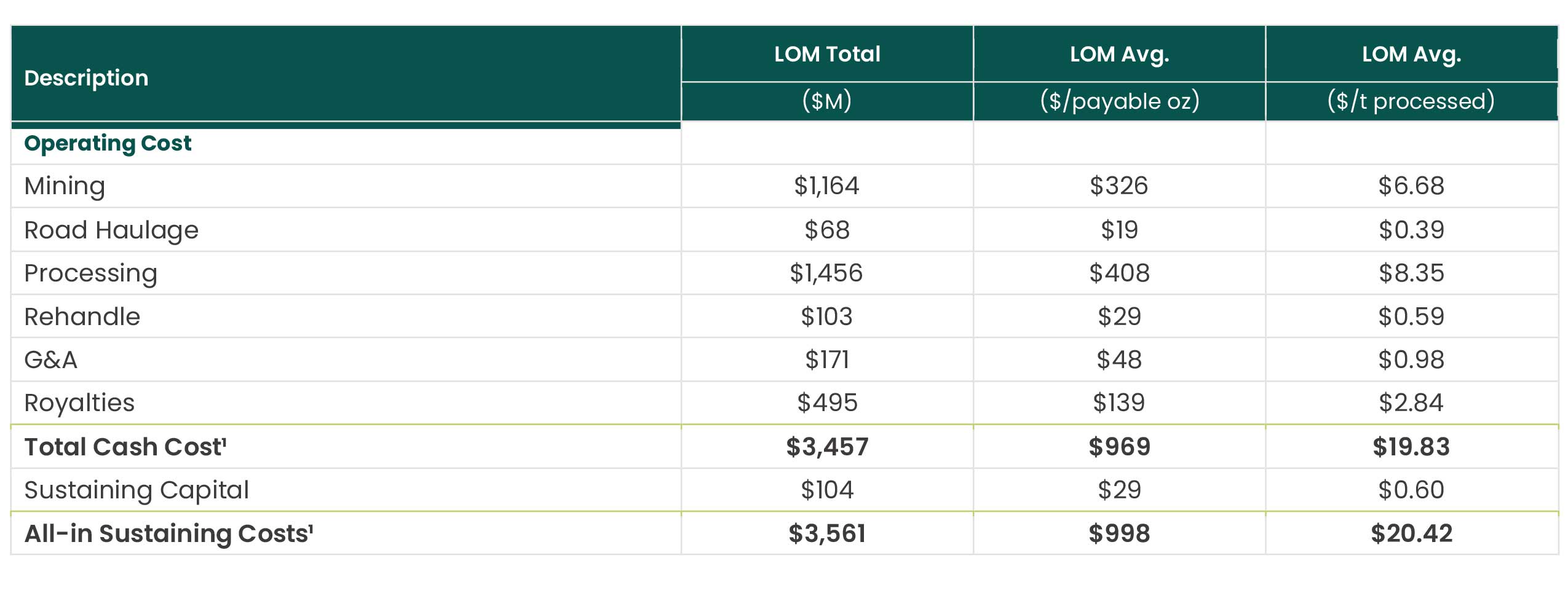
Financial Analysis
An economic analysis has been carried out for the Project using a cash flow model. The model has been constructed using annual cash flows taking into account annual processed tonnages and grades for the CIP feed, process recoveries, metal prices, operating costs and refining charges, royalties and capital expenditures (both initial and sustaining). A payable factor of 99.90% has been assumed for purposes of gold sales.
The financial analysis used a base price of $1,850 per ounce. The financial assessment of the Project is carried out on a “100% equity” basis and the debt and equity sources of capital funds are ignored. No provision has been made for the effects of inflation. Côte d’Ivoire tax regulations are applied to assess the tax liabilities (corporate tax rate of 25%), duties and other levies. Discounting and IRR calculations has been applied from the first year of operations using a 5% discount rate and pre-production capital is deducted on an undiscounted basis. A detailed annual summary cash flow model is provided in Appendix 1 of this release.
Sensitivity Analysis
Table 15 shows the Project sensitivity of the NPV, IRR, Cash Cost and AISC with gold price.
Table 15 – Project Sensitivity

Opportunities
Potential opportunities to improve the economics of the Koné Gold Project have been identified:
- The wider Koné Gold Project of 2,259 sq.km hosts over 100km strike extent of regional scale mineralised structures which are underexplored. These areas have the potential through further exploration to add satellite deposits to the current mine life.
- Continue discussions with contractors to look to achieve capital cost reductions.
- Continue to engage with stakeholders to maintain ease of Project implementation.
Koné Gold UFS Live Webcast
A conference call and webcast will be held on Friday, January 19, 2024, starting at 11:00am Eastern Time to discuss the Updated Feasibility Study on the Koné Gold Project. To participate in the conference call, use the following dial-in numbers and conference ID, or join the webcast using the link below:
International: +1 (416) 764-8659
North American Toll-Free: +1 (888) 664-6392
Conference ID: 39004138
Webcast URL: https://app.webinar.net/91Av7DERlpD
Notes:
- Cash costs per payable ounce of gold and per tonne processed, AISC per payable ounce of gold sold and per tonne processed are non-GAAP financial measures. Please see “Cautionary Note Regarding Non-GAAP Measures”. AISC per payable ounce includes all mining costs, processing costs, mine level G&A, royalties, and sustaining capital and is adjusted to reflect movements in stockpiles. Cash costs per payable ounce includes all mining costs, processing costs, mine level G&A, and royalties and is adjusted to reflect movements in stockpiles.
Contact
| Hugh Stuart President hstuart@montagegoldcorp.com |
Adam Spencer Executive Vice President, Corporate Development aspencer@montagegoldcorp.com mobile: +1 (416) 804-9032 |
ABOUT MONTAGE GOLD CORP.
Montage is a Canadian-based precious metals exploration and development company focused on opportunities in Côte d’Ivoire. The Company’s flagship property is the Koné Gold Project, located in northwest Côte d’Ivoire, which currently hosts a Probable Mineral Reserve of 174.3 Mt grading 0.72g/t for 4.01M ounces of gold. The Company released the results of a UFS on the Koné Gold Project on January 16, 2024, outlining a 16-year gold project producing 3.57M ounces of gold at AISC of $998 per ounce over the life of mine, with average annual production of 223koz, and peak annual production of 378koz. Montage has a management team and Board with significant experience in discovering and developing gold deposits in Africa.
The Koné and Gbongogo Main Mineral Resource Estimates were carried out by Mr. Jonathon Abbott of Matrix Resource Consultants of Perth, Western Australia, who is considered to be independent of Montage Gold. Mr. Abbott is a member in good standing of the Australian Institute of Geoscientists and has sufficient experience which is relevant to the commodity, style of mineralization under consideration and activity which he is undertaking to qualify as a Qualified Person under NI 43–101.
The Mineral Reserve Estimate was carried out by Ms. Joeline McGrath of Carci Mining Consultants Ltd., who is considered to be independent of Montage Gold. Ms. McGrath is a member in good standing of the Australian Institute of Mining and Metallurgy and has sufficient experience which is relevant to the work which she is undertaking to qualify as a Qualified Person under NI 43–101.
QUALIFIED PERSONS STATEMENT
The technical contents of this release have been approved by the following Qualified Persons pursuant to National Instrument 43-101:
- Sandy Hunter: Lycopodium Minerals Pty Ltd.
- Jonathon Abbott: Consulting Geologist, Matrix Resource Consultants
- Mike Hallewell: Consultant, MPH Minerals Consultancy Ltd.
- Pieter Labuschagne: Consultant, Australasian Groundwater & Environmental Consultants
- Carl Nicholas: Consultant, Mineesia Ltd.
- Joeline McGrath: Consultant, Carci Mining Consultants Ltd
- Tim Rowles: Consultant, Knight Piésold Pty Ltd.
TECHNICAL DISCLOSURE
Data verification programs have included review of QA/QC data, re-sampling and sample analysis programs, and database verification. Validation checks were performed on data, and comprise checks on surveys, collar co-ordinates and assay data. Sufficient verification checks were undertaken on the database to provide confidence that the database is virtually error free and appropriate to support Mineral Resource and Reserve estimation.
A technical report for the Koné Gold Project will be prepared in accordance with National Instrument 43-101 and will be filed on SEDAR at www.sedar.com and on the Company’s website at www.montagegoldcorp.com within 45 days of this press release. Readers are encouraged to read the technical report in its entirety, including all qualifications, assumptions and exclusions that relate to the details summarized in this press release. The technical report is intended to be read as a whole, and sections should not be read or relied upon out of context.
Neither the TSX Venture Exchange nor its Regulation Services Provider (as that term is defined in the policies of the TSX Venture Exchange) accepts responsibility for the adequacy or accuracy of this release.
TECHNICAL DISCLOSURE – SAMPLING AND ASSAYING
The technical contents of this press release relating to exploration results have been approved by Hugh Stuart, BSc, MSc, a Qualified Person pursuant to NI 43-101. Mr. Stuart is the President of the Company, a Chartered Geologist and a Fellow of the Geological Society of London.
Samples used for the results described have been prepared and analysed by fire assay using a 50-gram charge at the Bureau Veritas facility in Abidjan, Côte d’Ivoire or the SGS facility in Yamoussoukro, Côte d’Ivoire. Shallow RC reconnaissance results are based on 3 metre composite samples. Field duplicate samples are taken, and blanks and standards are added to every batch submitted. QA/QC has been approved in line with industry standards and interpretations reviewed the Qualified Person.
FORWARD LOOKING STATEMENTS
This press release contains certain forward-looking information and forward-looking statements within the meaning of Canadian securities legislation (collectively, “Forward-looking Statements”). All statements, other than statements of historical fact, constitute Forward-looking Statements. Words such as “will”, “intends”, “proposed” and “expects” or similar expressions are intended to identify Forward-looking Statements. Forward looking Statements in this press release include statements related to the Company’s mineral reserve and resource estimates; the timing and amount of future production from the Koné Gold Project; expectations with respect to the IRR, NPV, payback and costs of the Koné Gold Project; anticipated mining and processing methods of the Koné Gold Project; anticipated mine life of the Koné Gold Project; expected recoveries and grades of the Koné Gold Project; and timing for permits and concessions. Forward-looking Statements involve various risks and uncertainties and are based on certain factors and assumptions. There can be no assurance that such statements will prove to be accurate, and actual results and future events could differ materially from those anticipated in such statements. Important factors that could cause actual results to differ materially from the Company's expectations include uncertainties inherent in the preparation of mineral reserve and resource estimates and definitive feasibility studies such as the MRE and the UFS, including but not limited to, assumptions underlying the production estimates not being realized, incorrect cost assumptions, unexpected variations in quantity of mineralized material, grade or recovery rates, unexpected changes to geotechnical or hydrogeological considerations, unexpected failures of plant, equipment or processes, unexpected changes to availability of power or the power rates, failure to maintain permits and licenses, higher than expected interest or tax rates, adverse changes in project parameters, unanticipated delays and costs of consulting and accommodating rights of local communities, environmental risks inherent in the Côte d’Ivoire, title risks, including failure to renew concessions, unanticipated commodity price and exchange rate fluctuations, risks relating to COVID-19, delays in or failure to receive access agreements or amended permits, the impact and progression of the COVID-19 pandemic and other risk factors set forth in the Company’s final prospectus under the heading “Risk Factors”. The Company undertakes no obligation to update or revise any Forward-looking Statements, whether as a result of new information, future events or otherwise, except as may be required by law. New factors emerge from time to time, and it is not possible for Montage to predict all of them, or assess the impact of each such factor or the extent to which any factor, or combination of factors, may cause results to differ materially from those contained in any Forward-looking Statement. Any Forward-looking Statements contained in this press release are expressly qualified in their entirety by this cautionary statement.
NON-GAAP MEASURES
This press release includes certain terms or performance measures commonly used in the mining industry that are not defined under International Financial Reporting Standards (“IFRS”), including cash costs and AISC per payable ounce of gold sold and per tonne processed. Non-GAAP measures do not have any standardized meaning prescribed under IFRS and, therefore, they may not be comparable to similar measures employed by other companies. The Company discloses “cash costs” and “all-in sustaining costs” because it understands that certain investors use this information to determine the Company’s ability to generate earnings and cash flows for use in investing and other activities. The Company believes that conventional measures of performance prepared in accordance with IFRS, do not fully illustrate the ability of mines to generate cash flows. The measures, as determined under IFRS, are not necessarily indicative of operating profit or cash flows from operating activities. The measures cash costs and all-in sustaining costs are considered to be key indicators of a project’s ability to generate operating earnings and cash flows. Non-GAAP financial measures should not be considered in isolation as a substitute for measures of performance prepared in accordance with IFRS and are not necessarily indicative of operating costs, operating profit or cash flows presented under IFRS. Readers should also refer to our management’s discussion and analysis, available under our corporate profile at www.sedar.com for a more detailed discussion of how we calculate such measures.
Appendix 1 – Summary Production and Financial Model
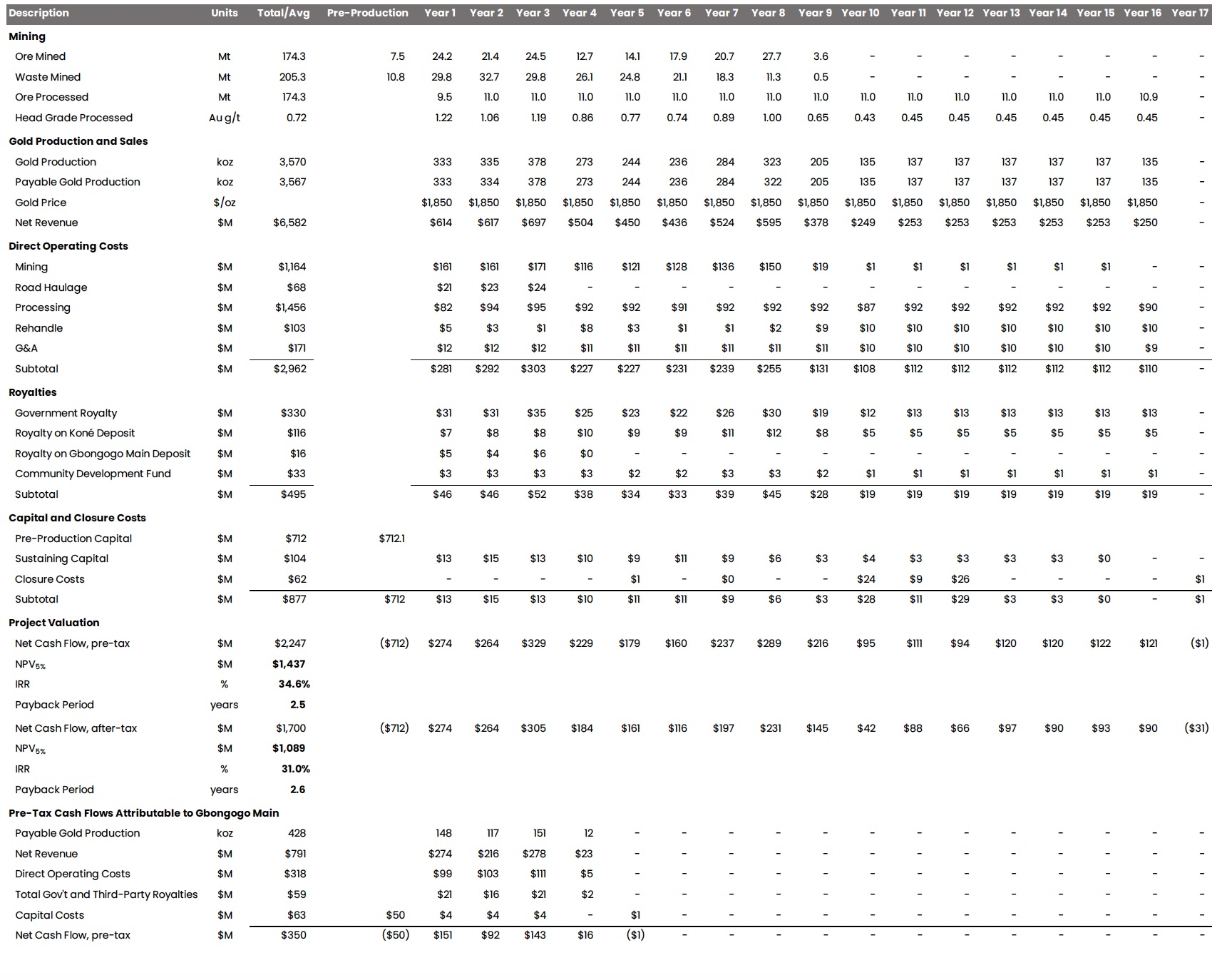
Appendix 2 – Listing of Intercept Detail for Diouma North
